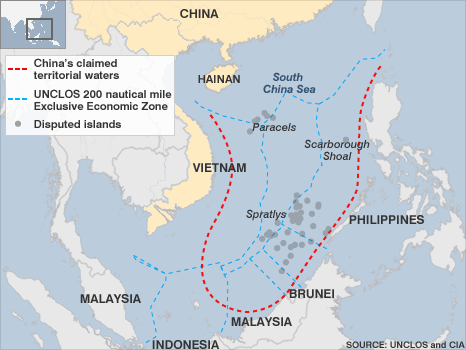Global Times | 2013-10-7
By Li Kaisheng
Common sense tells us that major powers usually predominate in the game of international politics. However, among the claimants in the South China Sea issue, the Philippines, a much smaller and less powerful nation than China, continues to provoke and seems to take the initiative in recent years by raising various complaints against China on this issue.
It did not only provoke the tension on Huangyan Island in April 2012, but repeatedly forced the South China Sea issue into the agendas of some meetings attended by ASEAN countries.
Earlier this year, Manila intentionally and unilaterally handed the issue to the UN arbitral tribunal, asking for a magnification of the issue, and the arbitration is still up in the air.
Recently its navy claimed that they were talking about the possibility of removing the concrete blocks on Huangyan Island, allegedly installed by China.
Similar cases, small but perennial, are too many to list. China has been upholding a much tougher attitude in the last couple of years, but its current position still seems on the defensive.
The current situation is partly caused by the two nations' foreign policies. China is still under the influence of its long-lasting policy of "hiding one's capacities and biding one's time," while the Philippines is becoming more provocative under the Benigno Aquino III administration.
In the political sphere of East and Southeast Asia, being "small and weak" is not a disadvantage, but an advantage for smaller powers under some special circumstances.
The reason why the Philippines can translate its small size and weak strength into an advantage comes from the particularity of the maritime disputes in East and Southeast Asia.
Although the South China Sea issue remains a traditional security issue whose solution largely depends on national strength and military power, often it is the power of rules instead of strength and force that plays an important role.
From the United Nations Convention on the Law of the Sea to the Declaration on the Conduct of Parties in the South China Sea or the envisaged Code of Conduct in the South China Sea, whoever makes the rules and uses them well will take the initiative in the game.
As long as the smaller countries have a good command of diplomatic skills and a profound knowledge of the rules, they will be hardly outmatched by the major powers.
The Philippines has also been given a fail-safe mechanism by the US, so that when diplomacy does not work, the US will have its back.
Washington and Manila have a long-standing military alliance, and US President Barack Obama's "pivot to Asia" policy has also stimulated Manila's confidence to roll up its sleeves.
Manila knows that as long as Washington's core interests can be guaranteed, the US will never engage in a fight with China just for the sake of the Philippines.
Nonetheless, Manila has been aware that although military confrontation with China is doomed, it is very likely to occupy the high ground of public opinion and perceived morality.
When international disputes break out, the international community usually shows sympathy to the disadvantaged party, even to the extent that the rights and wrongs of the issue will be ignored. Major powers are often labeled as hegemonies and bullies, and the smaller ones as victims.
What's more, in the eyes of Westerners, the Philippines is a democracy while China is a so-called communist "autocracy." This disparity adds weight to Manila's claim.
The more sympathy the Philippines gets, the more accusations China will have to face.
Although China has started to resort to multiple strategies to deal with the Philippines' provocations, it still remains the disadvantageous side, and some of its decisive actions even backfired, making the Philippines acquire more sympathy and support from the international community.
Given such circumstances, how to make wise use of rules in the South China Sea and change the current disadvantageous position will be a direct challenge for Chinese diplomacy in the future.
The author is an associate research fellow at the Institute of International Relations, Shanghai Academy of Social Sciences.
opinion@globaltimes.com.cn
Time to use rules well in maritime disputes - OP-ED - Globaltimes.cn











